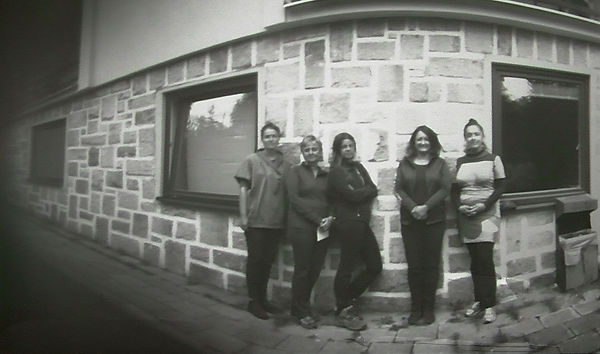SECTION 3
Covid-19 Won't Stop Us
Projects & Innovative Pedagogical Approaches

Hana Vacková
Gymnázium-Hejčín, Olomouc, Czech Republic
ArtCoMe
Between 2018–2020 students and their educators Hana Vackova and Jiri Vavra from Gymnazium Olomouc-Hejcin, participated in an international project Art & Contemporary Me, which involved a sole school from Poland, Hungary, the Czech Republic and Slovakia. The project focused on the individual’s unique experience involving a piece of art and was part of the Creative Europe Programme of the European Union in cooperation with The Olomouc Museum of Art, The International Cultural Centre in Krakow, The Bratislava City Gallery and The Janus Pannonius Museum in Pécs.





Studio Experiment
Petra Šobáňová, Daniela Smékalová, Eva Žváčková, Radka Novotná, Tereza Žváčková, Veronika Smékalová, Lenka Trantírková & Ludvík Urda, Studio Experiment Olomouc, Czech Republic




Postcivilization
The paper presents a summer art project by Studio Experiment for children and young people. The project focused on the reflection of the Covid 19 pandemic and successfully used elements of popular culture, such as cyberpunk, dystopian and postapocalyptic films and gamification. During the project-game for survival, the participants stylized themselves in a newly emerging society, which must preserve the essentials of the old civilization and survive in the new situation. The paper takes the form of an electronic book. The children called it the "Museum of Civilization" and present the knowledge they consider important for society. The main feature of the project was a fun game and adventure, which helped the children gain an overview of the pandemic.

Petra Vichrová
Department of Art Education, Pedagogical Faculty, University of South Bohemia in České Budějovice, Czech Republic
Creativity Restarted: Private Art Studio During the Coronavirus Crisis and Its Functioning
The paper presents the functioning of a private art studio in the period of limitation of its activities, based on the government measures against the spread of the coronavirus crisis. It describes the search for ways how not to lose contact with students and ways they can continue to learn distantly through digital tools and social media. The text also describes the approaches of parents and children to this form of teaching and a later return to the usual way of conducting lessons. At the end of the article, the traced facts are summarized and a possible way of using material, that indicated the connection of studio teaching with the distant home environment, is indicated.

Žváčková Tereza
Studio Experiment Olomouc, Czech Republic
Virtual vernissage | Camp – „There is an artist in everyone“
This summer (2020) there was a camp organized by Studio Experiment in Olomouc that was called „There is an artist in everyone“. 5 days of creating, 40 hours of creativity resulted in 11 art works. And because i tis important that an artist can speak about his art work, we made this alternative way of vernissage – virtual vernissage, where our art works are presented together with the artists that inspired us.





Barbora Přehnilová
Department of Art Education, Faculty of Education, Palacký University Olomouc, Czech Republic
Wherever I go, I see
The post with the title “Wherever I go, I see…” is an educational project was that was a part of my dissertation work and which is called ‘Historical sites of Olomouc from the point of view of a historian of architecture and an artistic painter and now I am continue work on this project in my current doctoral program at Palacký University in Olomouc. In the project "Wherever I go, I see", I am comparing how a historian and an artistic painter look at a site, what is the difference in their attitudes and what documentation techniques are used by each of them. Collected materials are the main source of information for the project “Wherever I go, I see…”. The main goal is not to only show selected sites but also by using comprehensive overview and visual materials present how we perceive our every-day-life surroundings. Furthermore, the goal is to encourage the public to think about what they can notice in particular while they routinely move around the city, especially in regards to the selected sites – how we can read them, what we can read in them and how we can document them. The aim of the project "Wherever I go, I see" is not to only point out how the two dissimilar fields can cooperate with each other but also encourage the public to sometimes stop, while commuting or walking on known paths, look around and see what they are actually looking at and inspire them to document the site or place by themselves rather than taking pictures, which will most likely become just a part of their backup hard drive. Check the facebook page: https://www.facebook.com/kudychodimvidim